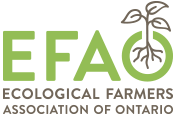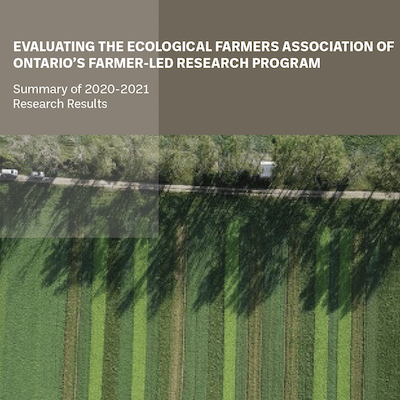A Summary of 2020-2021 Research Results
Report Prepared By: Dr. Erin Nelson, with Asm Easir Arafat, Sonya Ogilvie, Paige Allen & Jenna Livingston
Research Funded By: The Ontario Ministry of Agriculture, Food and Rural Affairs (OMFRA), through the Ontario Agri-Food Innovation Alliance
Download full report in PDF format >
Executive Summary
This report presents the results of an evaluation of the Ecological Farmers Association of Ontario’s (EFAO) Farmer-Led Research Program (FLRP). The work was funded by the Ontario Agri-food Innovation Alliance’s Knowledge Translation and Transfer (KTT) Program. As such, it focused on the ways in which EFAO’s FLRP generates and transfers knowledge to support adoption of environmentally sustainable farm management practices. The project employed a participatory approach, with the University of Guelph research team collaborating closely with the EFAO and other stakeholders to design and carry out the study. Data was collected through an online survey, a series of in-depth interviews and a focus group discussion. These built upon a program logic model that was also developed as part of the project.
General Findings
The online survey was part of a larger research project on the relationship between farmer-to-farmer networks and learning programs and adoption of soil health best management practices (BMPs). Some general findings were:
- The most commonly used BMPs are soil cover over winter, compost application, and cover cropping.
- More than three quarters of respondents felt the EFAO helped them improve their BMP knowledge as well as increase their adoption of specific BMPs.
- Farmer-researchers were far more likely than other respondents to report that the EFAO had a positive impact on their relationship with BMPs and on their social networks.
- The main barriers to BMP adoption are lack of time and labour, high cost, and insufficient knowledge.
- Almost one third of respondents have plans to initiate no-till farming in the future.
Farmer-Led Research Program Impacts
With respect to the FLRP more specifically, research results identified a number of beneficial impacts. The FLRP was found to:
- Facilitate effective communication about the benefits of ecological farming practices to a wide range of audiences.
- Foster a feeling of community amongst knowledge generators and users and across broader farmer-research networks.
- Enhance the quality and reliability of on-farm data collection.
- Enable farmers to make evidence-based decisions on their farms.
- Instill a strong sense of pride in participating farmer-researchers.
Limitations and Constraints
Results also demonstrated that the FLRP is subject to some limitations and constraints. The extent of available funding – and other resources, including land – limits the scale and scope of research projects that can be carried out. In addition, the research process requires significant investments of farmer time, which is a barrier to participation for some. The generalizability of results also presents a challenge given wide variations in climate, soil, and other factors across the province. Some strategies that could help address these and other issues include:
- Securing sustained investment of money and resources in farmer-led research.
- Increasing collaboration with other agricultural and research institutions.
- Incentivizing participation from a wider range of farmers.
- Exploring opportunities to share research results more widely with more audiences.

